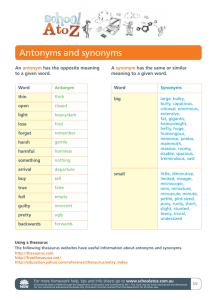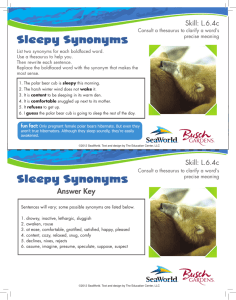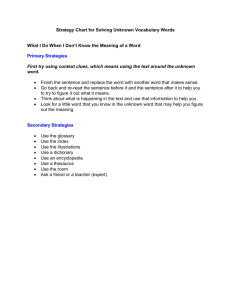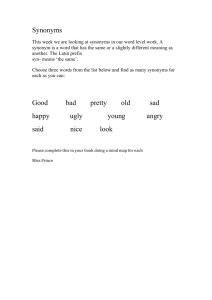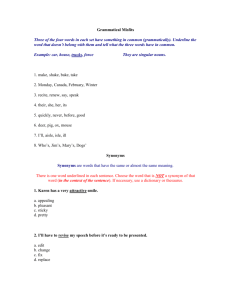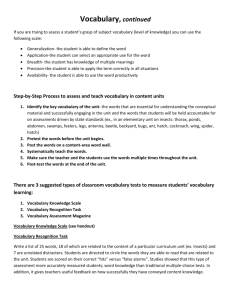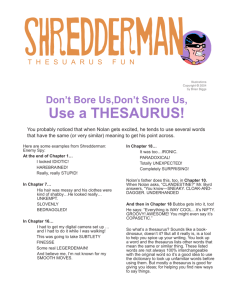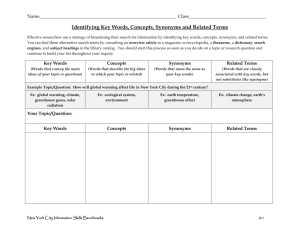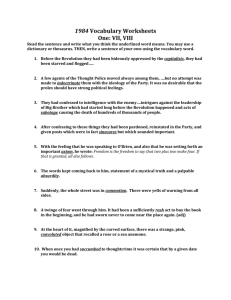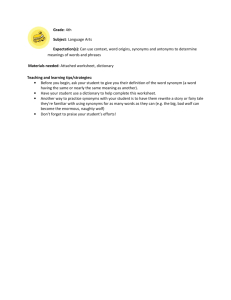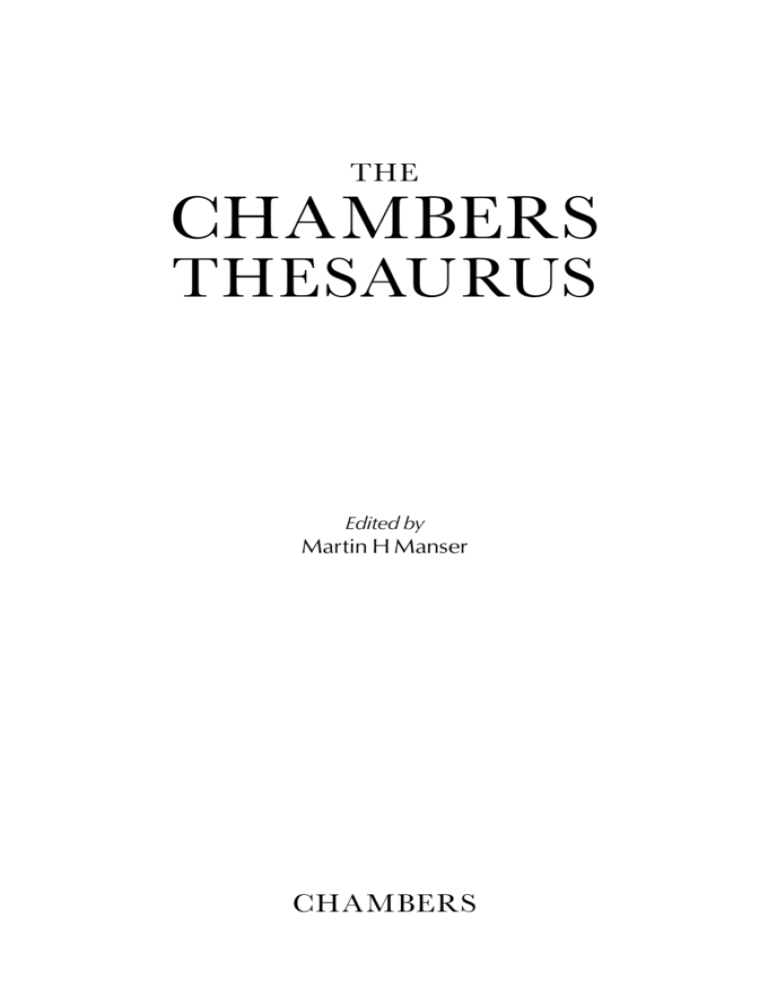
THE
CHAMBERS
THESAURUS
Edited by
Martin H Manser
CHAMBERS
CHAMBERS
An imprint of Chambers Harrap Publishers Ltd
7 Hopetoun Crescent, Edinburgh, EH74AY
Previous edition published1996
This edition published by Chambers Harrap Publishers Ltd 2004
ß Chambers Harrap Publishers Ltd 2004
We have made every effort to mark as such all words which we believe to be trademarks.We
should also like to make it clear that the presence of a word in the thesaurus, whether marked or
unmarked, in no way affects its legal status as a trademark.
All rights reserved. No part of this publication may be reproduced, stored in a retrieval system,
or transmitted by any means, electronic, mechanical, photocopying or otherwise, without the
prior permission of the publisher.
A CIP catalogue record for this book is available from the British Library.
ISBN 0550 10067 9
Designed and typeset by Chambers Harrap Publishers Ltd, Edinburgh
Printed and bound in Great Britain by William Clowes, Beccles, Suffolk
Preface
A thesaurus is a dictionary that provides alternatives to a particular word or phrase. It is the essential companion for
anyone who wants to create something satisfying out of words ^ a quick, convenient source of synonyms and related
terms that will help users express themselves in as precise, succinct and yet varied a manner as possible.
It was in1852 that Peter Mark Roget published his Thesaurus. Its full original title was TheThesaurus of English Words
and Phrases Classified and Arranged so as to Facilitate the Expression of Ideas and Assist in Literary Composition . His
purpose was to provide readers not only with synonyms for a word, but, more generally, with a wide choice of
expressions relevant to a particular concept. His method was to classify these within a framework of ideas on 17thcentury philosophical and scientific principles. This meant that a very full alphabetical index was needed to open up
the classified lists to the user. It was probably the complications of this system that ensured the continued popularity
of the more‘user-friendly’ type of word-finding book already in production in Roget’s time ^ the simple alphabetical
list of words, each followed by its own group of synonyms. More recently there has emerged the type of thesaurus
that, while preserving the alphabetical arrangement, acknowledges the value of Roget’s approach by supplying
related words within each entry on a rather broader, more comprehensive basis than that of mere synonymity.
The Chambers Thesaurus belongs to this last type ^ it lists the commonest, most synonym-rich words in the
language, arranged alphabetically, each with a plentiful supply of alternative and connected expressions. Selected
antonyms have also been added wherever appropriate. It has all the recognized usefulness of any thesaurus ^ but its
special advantage is that it draws on the rich resources of The Chambers Dictionary, known to dictionary
connoisseurs and wordgame enthusiasts alike as a mine of useful, interesting and diverting items of vocabulary.
In this second edition, the text has been enlarged by 20 per cent, with many entries revised, and over 1500 new
entries. Over 70,000 new synonyms and antonyms have been added, including many spellings and words from
varieties of English around the world, old (obsolete, archaic or literary) words, and technical terms and expressions.
It is recommended that The Chambers Thesaurus should be used in conjunction with The Chambers Dictionary, to
which it is the perfect companion volume, since the words listed are only rarely completely interchangeable
alternatives.
A thesaurus jogs the memory ^ it offers help to the person struggling to encapsulate a meaning in a forgotten mot
juste that might remain tantalizingly on the tip of the tongue. It is indispensable to the student, writer or reporter. A
thesaurus is fun to use, and with the fun comes the opportunity to enhance a personal command of words and
increase general knowledge. Words that may not be well known to the reader will trigger off investigations in a
dictionary, leading to an exploration of the remoter corners of the language. Finally, a thesaurus is a tool that the
word-gamester ^ player, solver or compiler ^ cannot do without.
It is hoped that readers will enjoy using this thesaurus not only to discover the exact word or phrase for an
appropriate context but also to appreciate more fully the rich diversity of the English language.
Martin H Manser
Aylesbury 2004
iii
Contributors
Editor
Martin H Manser
Project Editor
Mary O’Neill
Assistant Editor
Elaine O’Donoghue
Synonym Nuance Panels
Sheila Ferguson
Editorial Assistance
Helen Bleck
Kay Cullen
Carolyn Fox
Publishing Manager
Patrick White
Prepress
Clair Cameron
Sharon McTeir
Acknowledgements
For the second edition, the editor wishes to thank Rosalind Desmond for her careful keyboarding of the text and
Mary O’Neill, Siri Hansen, and Patrick White for their encouragement during the editorial work on this book.
iv
Features of the thesaurus
The following features are shown in context on pages vi ^ vii.
Clear distinction of senses
Can
Senses within an entry are distinguished by numbered
sections and by either a key synonym in SMALL CAPITALS or
an example in bold italics, eg
sad adj
1 UNHAPPY, sorrowful...
Aust
NZ
S Afr
2 sad news
Related adjectives
Example phrases or sentences are based on citations
from the British National Corpus.
Where a headword has an adjective related to it, a note is
included. For example, the entry meaning gives the
related adjective semantic .
upsetting, distressing...
Synonyms grouped by register
(used mainly in Canada, rather than the United
States)
(Australian)
(New Zealand)
(South African)
Confusable words
Synonyms are listed by range of context (‘register’) to
show the appropriate styles within which words are
used.
Where a headword is sometimes confused with another
word, eg censor or censure, fatal or fateful, concise
explanatory notes are included to distinguish them.
The explanations are backed up by example phrases
and sentences based on citations from the British
National Corpus.
TECHNICAL
indicates a word that is restricted to a certain subject area
such as music, philosophy, medicine or law, eg codicil (a
supplement to a will) at supplement
Hyponym panels
OLD
indicates a word that is no longer in common use, be it
obsolete, archaic or literary, eg spoffish at fussy
Around 500 special panels show word families
(‘hyponyms’), and give lists of related words presenting :
x different types of, eg film, food and sport
Shakesp and Spenser are extra labels used to annotate
words featured in the works of Shakespeare and
Spenser.
x parts of, eg the brain, a flower and a motor vehicle
x the terminology used in particular subject areas, eg
cookery, football and medicine
FORMAL
indicates a formal word, eg discourse and colloquium at
discussion
x informative encyclopedic information, eg longest
rivers, highest mountains and active volcanoes
COLLOQ.
indicates an informal word, eg powwow at discussion
Synonym nuance panels
SLANG
Synonym nuance panels distinguish shades of meaning
among synonyms in over 300 entries, identifying and
exemplifying words that :
x have particular associations or convey certain
suggestions:
unworldly suggests a vulnerability arising from lack
of experience: a schoolgirl who was unworldly in
the extreme.
indicates a word used only very informally, eg dough and
dosh at money
derog , offensive, vulgar and taboo are extra labels used
to annotate words considered particularly vulgar or
which may give offence.
Countrywide and worldwide English
Terms from varieties of English from around Britain and
around the world are included (eg North American
ornery at stubborn ), and labelled as
dialect (usually indicates Northern English dialects)
Scot (Scottish)
Welsh
Irish
N Am (used mainly in the United States and,
sometimes, Canada)
x have a particular tone or convey an attitude on the part
of the speaker:
both gullible and credulous further imply a
tendency to be duped and are rather more
contemptuous in tone: he treated her as a
credulous imbecile.
x usually have a specific referent or context :
consort is a formal term which tends to be reserved
for a spouse: the queen’s consort.
v
Structure of thesaurus entries
Headwords in bold type at
the beginning of each entry
brain n
1 damage to the brain
cerebrum
TECHNICAL encephalon, sensorium
OLD (Shakesp) pia mater
SLANG upper storey
Register labels in bold
small capitals
Related adjectives : cerebral, encephalic
2 MIND, head, intellect, intelligence, wit, reason, sense,
common sense, shrewdness, understanding
FORMAL acumen, sagacity
COLLOQ. grey matter, brains, nous, savvy
3 the real brain in the family
Antonyms, indicated by
, in numbered sections
corresponding to those of
the synonyms
Hyponym panels
Synonyms or alternative
words listed after the
headword, and arranged
according to shades of
meaning
Geographical
information in italic labels
mastermind, intellectual, scholar, expert, pundit,
highbrow, genius, prodigy
COLLOQ. egghead, boffin, brainbox, cleverclogs
3 simpleton, idiot
Parts of the brain include :
brainstem
Broca’s area
cerebellum
cerebral cortex
cerebral
hemisphere
cerebrum
cinerea (grey
matter)
corpus callosum
forebrain
frontal lobe
hindbrain
hypothalamus
medulla
oblongata
meninges
mesencephalon
midbrain
occipital lobe
optic thalamus
parietal lobe
pineal body
pituitary gland
pons
spinal cord
temporal lobe
thalamus
Wernicke’s area
brainless adj
silly, stupid, crazy, daft, foolish, incompetent, half-witted,
simple-minded, idiotic, inept, mindless, thoughtless,
senseless
sensible, shrewd, wise
brainteaser n
riddle, puzzle, problem, conundrum, mind-bender,
poser; N Am brain-twister
brainwashing n
indoctrination, conditioning, pressurizing, re-education,
grilling, intellectual suicide, mind-bending, persuasion
FORMAL menticide
brainy adj
intellectual, intelligent, clever, gifted, smart, bright,
brilliant, wise
FORMAL sapient
dull, stupid
Parts of speech listed after
the headword and treated in
order within the entry
brake n, v
• n
check, curb, rein, restraint, control, restriction,
constraint, drag
FORMAL retardment
• v
slow (down), decelerate, reduce speed, drag, slacken,
moderate, check, halt, stop, pull up
FORMAL retard
accelerate
vi
Structure of thesaurus entries
branch n, v
• n
1 BOUGH, limb, sprig, shoot, stem, offshoot, arm, leg,
lobe, loop, wing, prong, whip, withy; Scot cow, scrog
TECHNICAL ramus, axis, cladode, phylloclade
OLD braunch, rice
Related adjectives : ramal, rameal, rameous, ramous
Related adjective notes
2 a different branch of the company
department, office, local/regional office, agency,
bureau, part, section, division, subsidiary, subsection,
subdivision, affiliate, corps, wing, discipline
FORMAL succursal, ramification
3 the branch of a river
tributary, fork, division
F branch
off
Idioms and phrasal verbs
highlighted separately at the
end of entries
divide, fork, diverge, deviate, separate
FORMAL bifurcate, furcate
F branch
out
diversify, subdivide, vary, develop, expand, enlarge,
spread out, extend, add to, broaden out, increase,
multiply, proliferate
FORMAL ramify
brand n, v
• n
1 different brands of soap
make, brand-name, tradename, trademark, line, logo,
symbol, sign, emblem, label, stamp, hallmark, marque
2 KIND, quality, class, type, sort, line, variety, species
3 MARK , tag, identification, identifying mark
• v
Different meanings in
numbered sections
Key synonyms in small
capitals
1 branded as a troublemaker
mark, stamp, label, typecast, stigmatize, stain, taint,
disgrace, discredit, denounce, censure
FORMAL besmirch
2 brand cattle
mark, stamp, burn (in), sear
brandish v
wave, flourish, shake, raise, swing, wield, flash, flaunt,
exhibit, display, parade
OLD wag, wampish; (Spenser) bless, hurtle
bravery n
courage, pluck, fearlessness, boldness, courageousness,
daring, stalwartness, hardiness, fortitude, resolution,
tenacity, stout-heartedness, valour, gallantry, chivalry,
heroism, indomitability, mettle, spirit, dauntlessness,
audacity, bravado, prowess
FORMAL intrepidity, valiance
COLLOQ. guts, grit, spunk
cowardice, fearfulness, faint-heartedness, timidity
! bravery or bravado ?
Example phrases in bold
italics
Additional information in
bracketed italic labels
Notes on words easily
confused indicated by !
Bravery is courage: soldiers decorated for bravery.
Bravado is a boastful act of bravery intended to impress
or intimidate or a boastful pretence of bravery aimed at
concealing cowardice: She felt her defiant bravado
disintegrate like shattered glass .
Synonym nuances
Courage is used in general contexts, whereas pluck
has a very positive aspect of spiritedness, and is often
vii
Synonym nuances panels
Abbreviations used in the thesaurus
adj
adv
Aust
Can
colloq.
conj
derog
E
interj
N
n
N Am
NZ
prep
pron
adjective
adverb
Australian English
Canadian English
colloquial
conjunction
derogatory
east, eastern
interjection
north, northern
noun
Õ
S
S Afr
Scot
Shakesp
v
W
viii
North American English
New Zealand English
preposition
pronoun
trademark
south, southern
South African English
Scottish English
found in Shakespeare’s works
verb
west, western

